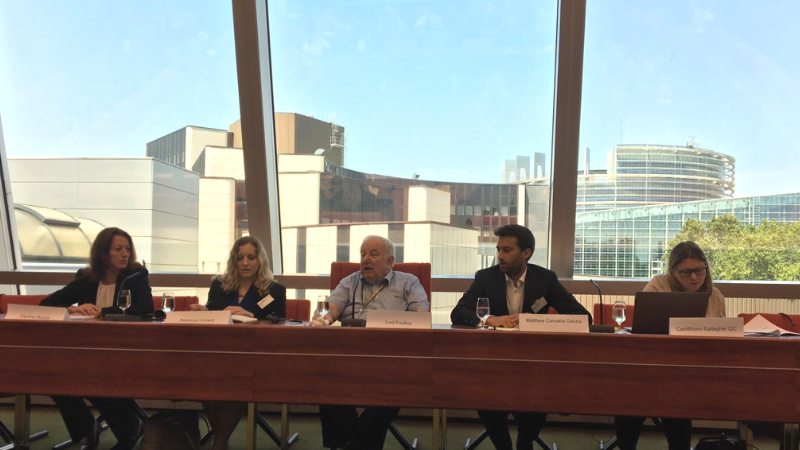The call for a public inquiry into the assassination of Daphne Caruana Galizia “is not about political parties. It is not about the Prime Minister, and it is not about the governing party. It is about justice.”
This was the opening statement of Matthew Caruana Galizia, son of the murdered journalist, who took part in today’s panel debate at the Council of Europe headquarters in Strasbourg to address the key findings in the report by Special Rapporteur Pieter Omtzigt on the rule of law in Malta.
Caruana Galizia was joined on stage by Shift News founder and editor Caroline Muscat, RSF’s UK Bureau Director Rebecca Vincent, Caoilfhionn Gallagher QC, Barrister from Doughty Street Chambers. The event was co-sponsored and moderated by Lord Foulkes.
The recent Council of Europe report raised serious concerns about the rule of law in Malta, and about the “glacial pace” of the Daphne Caruana Galizia murder investigation, which it describes as suffering from a “prevailing culture of impunity”.
Caoilfhionn Gallagher QC, legal counsel for the Caruana Galizia family, used her opening statement to explain that a prompt, independent inquiry which involves the next of kin is a requirement under Article 2 of the European Court of Human Rights, and that the standard for triggering such an investigation is very low. The government of Malta is violating treaty obligations by failing to call such an inquiry.
Gallagher used the words “incompetence” and “disturbing” when referring to the current state of the murder investigation, and noted that if criminal charges are not filed by the summer, the three men who are accused of detonating the bomb that killed Caruana Galizia will be released on bail.
Rather than address the serious questions raised by Omtzigt, Malta seems determined to smother them.
Reporters Without Borders UK Bureau Chief Rebecca Vincent described how Maltese government representatives were employing “extensive resources, including embassies” to lobby against the Council of Europe report and to discourage member states from voting in favour of it.
Given the total absence of justice in the country, Vincent stressed that Member States must instead use international mechanisms to hold the government of Malta accountable.
Vincent went on to detail a number of attacks on press freedom in Malta, stating, “We have seen things in Malta that we have never seen in any other country”, including over 20 posthumous libel suits filed against Daphne Caruana Galizia, some by the Prime Minister and senior government officials.
“I have never seen a country where a memorial to someone who has been murdered has been cleared by the state some hundreds of times”, she said, or one where “those calling for justice are so viciously attacked”.
This is not the first time Malta’s ruling party has been accused of targeting the messenger in order to silence the message.
Caroline Muscat described the results of a Shift News investigation into secret Labour Party Facebook groups that were used to coordinate smear campaigns and organized harassment against Daphne Caruana Galizia in the lead up to the journalist’s assassination.
These groups continue to be used to target independent journalists and opposition voices in Malta today, resulting in a prevailing “culture of impunity” that has created a climate where the few independent journalists in the country are left isolated, and are often targeted and openly insulted by members of the public and the government.
Current events added weight to Muscat’s statements. It came to light during the debate that Special Rapporteur Pieter Omtzigt has also been subjected to coordinated attempts to discredit him, which Lord Foulkes referred to as “utterly disgraceful”, adding that a Member of Parliament and someone working on behalf of the Council of Europe should not have to suffer personal attacks.
Despite determined lobbying against it by the government of Malta, the Special Rapporteur’s report was adopted by the Committee on Legal Affairs and Human Rights on 29 May and is scheduled to go to vote for final adoption by the Parliamentary Assembly this evening.
All four panelists in today’s debate were unanimous in calling on members of the Parliamentary Assembly to vote in favour of the report.
Their endorsement was echoed by the leading press freedom organizations who supported today’s panel debate, including the European Federation of Journalists, Article 19, the Committee to Protect Journalists, the European Centre for Press and Media Freedom, Justice for Journalists Foundation, PEN international, IFEX, and the International Press Institute.
The Maltese government filed a total of 13 amendments to the report ahead of this evening’s vote. Despite receiving the support of representatives from Azerbaijan, San Marino, and Hungary, the Committee on Legal Affairs and Human Rights of the Parliamentary Assembly of the Council of Europe rejected all but one of Malta’s amendments, adopting Omtzigt’s report “by a large majority”.
“This is an opportunity for the government to bring Malta in line with European standards on the rule of law,” noted Muscat. “Instead, the government has focused efforts on watering down the report, with Azerbaijan as its staunchest defender. That, in itself, says a lot”












